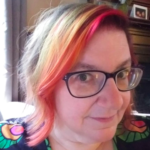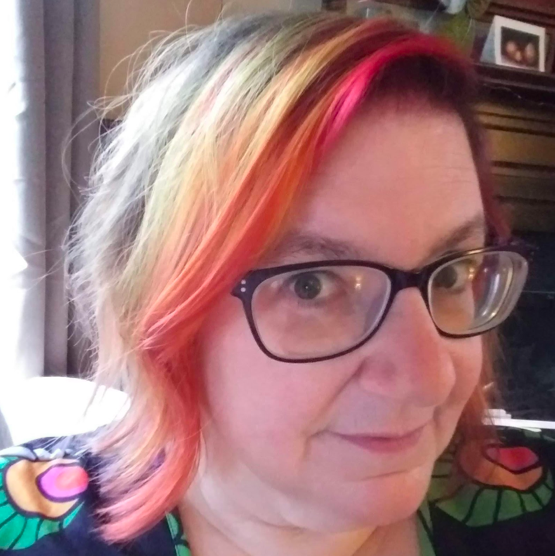 Nothing makes you feel old like your niece’s new girlfriend calling you a pioneer.
Nothing makes you feel old like your niece’s new girlfriend calling you a pioneer.
She slid into the spare chair next to us at a recent family gathering and began listing her accomplishments like she was interviewing for a job as a young lesbian mover-and-shaker. And then she said something about honoring our experience and called us “pioneers.”
I realized I’m an elder in the LGBTQIA+ community. At 52 years old.
How did THAT happen?
Pioneers of the queer community were those before me, fighting for recognition at Stonewall in the 60s, fighting for tolerance and inclusion in the 70s, and fighting for our lives in the 80s and 90s as the AIDS epidemic rolled through.
I wasn’t a pioneer. I was just trying to get laid by a beautiful woman.
I came out because I fell in love with a magnetic lady and was unwilling to live my life in the closet. Since we couldn’t get legally married in 1992, we just decided to be married. The ceremony went like this:
“Would you like to be married to me?”
“Yes!”
“Poof! We’re married.”
It was our first ceremony, and my favorite, as we embarked on our now thirty years of marriage.
When we got together, the thought that we could ever be legally married never seemed more than a fantastic dream. In the 90s, the barrier felt too high and, frankly, not interesting enough to climb. I relished the rebellion of my queerness, but never marched about it. In fact, my direct political action after coming out included attending two Pride parades and sending a letter to Bill Clinton asking him not to sign the Defense of Marriage Act.
So much for that request!
My political work ended up being more grassroots, simply living my life without hiding my queerness and treating it like the normal life that it is. It was a quiet kind of rebellion that many queer people in my generation chose. And one that, in its own queer-normative fashion, led to this new way of being that we see in young people today.
A young friend of mine, a person I crocheted an afghan for when they were born, amazed me a couple of years ago when they came out as non-binary.
The sheer bravery of rejecting the gender binary takes my breath away. I admire someone going against the grain like that to be who they are, especially knowing how hateful people can be. Simply embracing my bisexual nature took a leap, and discovering that I had deeper connections with women than with men seemed like a breach of etiquette somehow. I’d been using the right fork my whole life, then discovered that I preferred to use the salad fork to eat my steak.
To throw away the place setting entirely? What would Emily Post say?!
I marveled at this person. When they visited, they thanked me and my wife for using their preferred pronouns, sharing tales of relatives who ignored their new identity. The casual cruelty seemed a slap in the face to me, but they took it in stride, and I followed their lead.
Which is the way to do it. Always follow the lead of the person being oppressed.
I don’t want to have to ask them what they need me to do – I’d rather swoop in like a Victorian Adventuress, fighting off the evil-doers with my dainty sword-cane – but I’ve found it’s the best way to support them. (FYI, that would always be followed by giving them homemade cookies with butterscotch, dried cranberries, and oatmeal, warm from the oven.)
But being an elder in the LGBTQIA+ community today means asking questions and listening to the answers. Combining my experience and knowledge to advise but not direct. Making my home a place of refuge for any who may need it.
And making my home secure loops me back around to the question of same-sex marriage. My wife and I legally married in 2014 in Frederick, Maryland, a year before the Obergefell v. Hodges Supreme Court ruling made same-sex marriage legal across the US. I carry a laminated copy of our marriage license in my purse, just in case people don’t believe we’re married. My wife had a stroke in 2017 and, though I’ve never been challenged, hospitals are places where authority can get a little full of itself.
Best to keep the paperwork around.
With the new Supreme Court line-up, federal recognition of same-sex marriage equality seems to be on the verge of being overturned. With that change, we need to reconsider where we live. Despite the inclusive nature of Asheville, that change would mean the state of North Carolina would no longer be required to recognize our marriage.
What would that mean? Hospital employees could potentially block me from staying with my wife in her hospital room (good luck to the poor schmuck who tries that one!). We’d have to go back to filing our taxes separately. All of our legal documentation would have to be scrutinized for assumptions of marriage.
Social security wouldn’t be accessible to the surviving partner if needed because even though social security is a federal program, it makes its beneficiary decisions based on the laws of the state where the couple resides, and for social security to transfer to the surviving spouse, your marriage needs to be recognized by the state where you live.
Thus, for our own safety (which is essential if we are to be a place of refuge), we must consider moving to a state where same-sex marriage was actively legalized before the federal ruling in 2015.
I mean, sure, I could fight, but it’s not in my nature. Plus, I’m working full-time, taking care of my stroke-affected wife, keeping up our household, and battling the hot flashes of menopause.
I’m a tired pioneer!
But if you’re feeling feisty on my behalf, let me know.
The cookies will be warm when you get here.
Women AdvaNCe compiled a list of Pride Month events happening this June! You can check it out here.
 LA (as in tra-la-la) Bourgeois identifies as a beauty-parlor-loving lesbian housewyfe, anti-racist, LGBTQ+ elder, white cis-woman whose pronouns are she/her/ma’am. You can find more of her writing at housewyfe.com.
LA (as in tra-la-la) Bourgeois identifies as a beauty-parlor-loving lesbian housewyfe, anti-racist, LGBTQ+ elder, white cis-woman whose pronouns are she/her/ma’am. You can find more of her writing at housewyfe.com.

There are no comments
Add yours